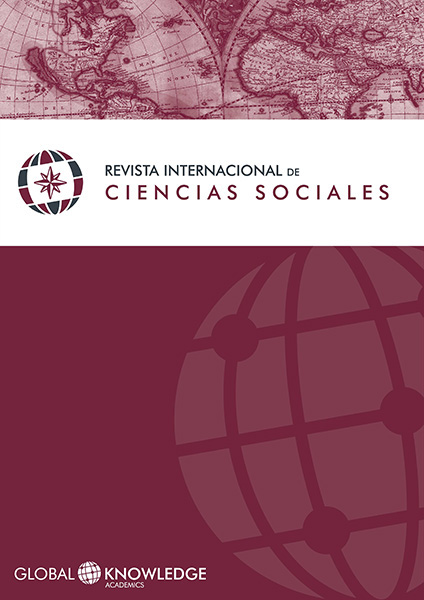Instagram Use and it´s Effects on Self-Esteem of Teen Students
DOI:
https://doi.org/10.37467/gka-revsocial.v8.2324Keywords:
Social Networks, Instagram, Self-Esteem, AdolescenceAbstract
Technological developing provides better chances of communication and social participation but transforms the ways of learning and valuing aspects such as life, love, sexuality and family. Privileged use of images and photographs in social networks implies changes of psychological nature. In this research you will find aspects of social approval that is being chased on by teenage students who are users of Instagram, through the analysis of their profiles, correlated with the results of the application of reliable statistical instruments about changes in their selfesteem related to the use of this social network.
Downloads
Global Statistics ℹ️
|
11146
Views
|
11865
Downloads
|
|
23011
Total
|
|
References
Del Río, Mairem. (2016). Así afectan las redes sociales a tu autoestima. Localizado el 4 de octubre del 2018 en http://www.veintitantos.com/quierete-autoestima-coach/asi-afectan-las-redes-sociales-tu-autoestima
Gimenez, Paola, Correché, Susana, & Rivarola, Fernanda. (2013). Autoestima e Imagen Corporal. Estrategias de intervención psicológica para mejorar el bienestar psico-lógico en pre- adolescentes en una escuela de la ciudad de San Luis, Argentina. Fundamentos En Humanidades, 14(27), 83–93. Retrieved from http://search.ebscohost.com/login.aspx?direct=true&db=zbh&AN=108395487&lang=es&site=ehost-live
Hwang, Ha Sung, & Cho, Jaehee. (2018). Why Instagram? Intention to Continue Using Instagram among Korean College Students. Social Behavior & Personality: An In-ternational Journal, 46(8), 1305–1316. https://doi.org/10.2224/sbp.6961 DOI: https://doi.org/10.2224/sbp.6961
Instagram (2018). Instagram. About us. Localizado el 17 de octubre de 2018 en https://www.instagram.com/about/us/
Instituto Federal de Telecomunicaciones (2018). En México 71.3 millones de usuarios de internet y 17.4 millones de hogares con conexión a este servicio: ENDUTIH 2017 (Comunicado 015/2018). Localizado el 16 de octubre de 2018 en http://www.ift.org.mx/comunicacion-y-medios/comunicados-ift/es/en-mexico-713-millones-de-usuarios-de-internet-y-174-millones-de-hogares-con-conexion-este-servicio
Instituto Nacional de Estadística, Geografía e Informática (2017). Estadísticas a propósito del día mundial del Internet. Datos nacionales. Localizado el 15 de octubre de 2018 en http://www.inegi.org.mx/saladeprensa/aproposito/2017/internet2017_Nal.pdf
Kerschbaum, Rebecca. (2015). Selfie: el fenómeno que trasciende en la Web. Tesis para obtener el título de Licenciada en Periodismo Multimedios. Colegio de Comuni-cación y Artes Contemporáneas. Universidad de San Francisco de Quito. Ecuador. Localizada el 17 de octubre de 2018 en http://repositorio.usfq.edu.ec/bitstream/23000/4197/1/113658.pdf
Martí, Elena. (2017). El síndrome Selfie: de la moda del narcisismo . Localizado el 4 de octubre del 2018, en http://www.centroadiccionesbarcelona.com/el-sindrome-selfie-de-la-moda-al-narcisismo/
Niebla, J. C., Hernández-Guzmán, L., & González-Montesinos, M. (2011). Prueba de Auto-estima para Adolescentes. Universitas Psychologica, 10(2), 535–543. Retrieved from http://search.ebscohost.com/login.aspx?direct=true&db=zbh&AN=71093059&lang=es&site=ehost-live DOI: https://doi.org/10.11144/Javeriana.upsy10-2.papa
Sosa, Dolores (2018). Relaciones interpersonales entre los jóvenes universitarios y los espacios de presentación virtual. Tesis de doctorado para la obtención del grado de Doctora en Ciencias Sociales y Humanísticas. Centro de Estudios Superiores de México y Centroamérica, Universidad de Ciencias y Artes de Chiapas, Chiapas, México
Scale for Social Comparison Orientation (INCOM, Iowa-Netherlands Comparison Orienta-tion Scale). Localizado el 24 de octubre de 2018 en http://www.apbuunk.com/pdf/questionaires/Scale-Social-Comparison-Orientation-EN.pdf
Stapleton, P., Luiz, G., & Chatwin, H. (2017). Generation Validation: The Role of Social Comparison in Use of Instagram Among Emerging Adults. CyberPsychology, Be-havior & Social Networking, 20(3), 142–149. https://doi.org/10.1089/cyber.2016.0444 DOI: https://doi.org/10.1089/cyber.2016.0444
Valencia, Carlos. (2012). La autoestima. Localizado el 4 de octubre de 2018 en https://www.laautoestima.com/autoestima.htm
Downloads
Published
How to Cite
Issue
Section
License
Those authors who publish in this journal accept the following terms:
-
Authors retain copyright.
-
Authors transfer to the journal the right of first publication. The journal also owns the publishing rights.
-
All published contents are governed by an Attribution-NoDerivatives 4.0 International License.
Access the informative version and legal text of the license. By virtue of this, third parties are allowed to use what is published as long as they mention the authorship of the work and the first publication in this journal. If you transform the material, you may not distribute the modified work. -
Authors may make other independent and additional contractual arrangements for non-exclusive distribution of the version of the article published in this journal (e.g., inclusion in an institutional repository or publication in a book) as long as they clearly indicate that the work was first published in this journal.
- Authors are allowed and recommended to publish their work on the Internet (for example on institutional and personal websites), following the publication of, and referencing the journal, as this could lead to constructive exchanges and a more extensive and quick circulation of published works (see The Effect of Open Access).













